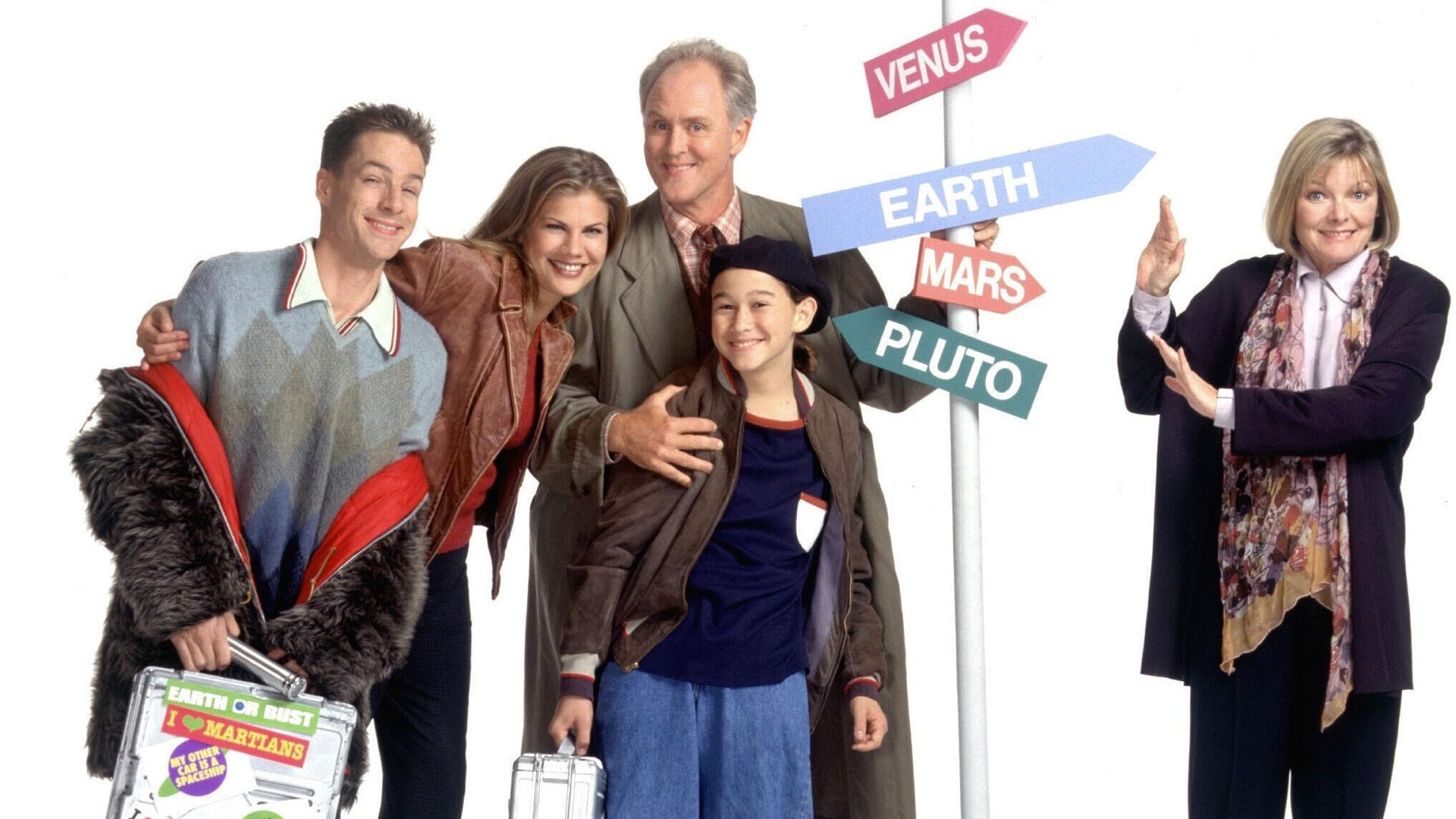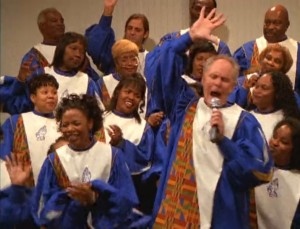 Recently I’ve been enjoying reruns of 3rd Rock from the Sun on Hulu. For readers unfamiliar, this NBC sitcom ran from 1996 to 2001 and focuses on four aliens that came to earth in the 1990s to do anthropological research on our species. The humor of the show is of course based on cultural misunderstandings as the aliens — residing in Ohio, USA — attempt to “fit in” and understand the locals. As in such shows, of course the audience learns more about being “human” by watching these aliens become humans themselves.”
Recently I’ve been enjoying reruns of 3rd Rock from the Sun on Hulu. For readers unfamiliar, this NBC sitcom ran from 1996 to 2001 and focuses on four aliens that came to earth in the 1990s to do anthropological research on our species. The humor of the show is of course based on cultural misunderstandings as the aliens — residing in Ohio, USA — attempt to “fit in” and understand the locals. As in such shows, of course the audience learns more about being “human” by watching these aliens become humans themselves.”
*****
In the episode titled “Dick Who’s Coming to Dinner,” the main character — an alien named Dick Solomon (played by John Lithgow), who took the form of a forty-something white man and who is a professor of physics at a small liberal arts college — learns that some of his peers and students attend a black student union, of which he was previously unfamiliar. He’s at first offended by his exclusion from the group, but then he begins to learn of the legacy of white superiority in the the US. Upon being confronted with the history of “white oppression,” “slavery,” and “Japanese internment camps,” he exclaims “I didn’t do any of those things!”
This leads him to read up on the matter, at which point he becomes distraught, and he confesses to his office mate and love interest, Dr. Mary Albright (played by Jane Curtain): “I colonized every continent. I enslaved an entire people. And even after I abolished slavery, I, [pauses] … I continued to marginalize minorities with economic disincentives!” The following exchange ensues:
Mary: Don’t let this eat you up. … I know how you feel. … Dick, I’ve been through this white guilt thing too.
Dick: White guilt?
Mary: Oh yeah. As a matter of fact one of my ancestors was a proponent of slavery.
Dick: Who?
Mary: Well actually, [pauses] … my mom.
Dick: How do you live with yourself?
Mary: She’s not me. And I’ve learned, by observing her behavior, that we have the power of doing whatever we want. We have the power to make changes in society. … So stop feeling guilty and do something. After all, it’s not like you picked the color of your skin, right?!”
Dick goes home to discuss this with his fellow aliens, and asks them why they chose white bodies in the first place. Tommy (played by Joseph Gordon-Levitt) points out that the television signals sent out to them in outer space “were filled with white people.” They go on:
Dick: We’ve unwittingly aligned ourselves with the most despicable force in western civilization.
Tommy: We can’t do anything about that. We can’t change society.
Dick: And that’s where you’re wrong. Mary says we can. And you know what? I’m gonna do it. … I’m going to revitalize America’s urban education system. I’m gonna create enterprise zones to draw in investors. I’m going to set up a ONE BILLION DOLLAR minority scholarship fund. And I’d like us, as a familyto kick it with Sean “Puffy” Combs more often.
Tommy: No, Dick, I mean’t it’s against the rules of our mission to change society.
At first despondent, Dick suddenly decides he’s nevertheless going to improve his relationship with his black co-worker instead. He shows up at her stereotypical African-American Protestant church, where a giant choir is singing and there’s an ongoing call and response between the choir, the choir leader, and the folks in the pews. Dick pops up behind one of the pianos and interrupts with his own song:
He see’s the light. He reads the books. … This fool, he thinks he knows everything, but still he knows nothing. You know why? … He picked the white body. … He didn’t know he had a whole rainbow to pick from. Nobody told him. … And I, Dick Solomon, I need you to tell me, tell me I can be a good man. Tell me I can be good, in spite of my color.
The singers chorus that yes, he can be good, and then suddenly he unknowingly sings something offensive, bringing the sitcom scene to an end with audience laughter.
*****
What do white audiences learn about being human in this episode? Three points. First, whites can identify with Dick when he says he didn’t personally contribute to any of those historical tragedies. I identify as white, but I was born long after slavery, or Jim crow laws, or Japanese internment camps, and so on. How can I be expected to take responsibility for those events? As Mary says of her racist mother: “she’s not me.” Those people might have identified as white, but they’re not me.
Second, one of the gags comes when Mary asks, “it’s not like you picked the color of your skin, right?!” Of course the joke is that he did, in fact, pick the color of his human body. But what about white viewers? Apart from those few who are persuaded in the theory of reincarnation according to which we choose to location and circumstances of our rebirth, most of us do not think we chose our race or ethnicity. It befell us as a result of circumstances outside our control. Thus when Dick says, “We’ve unwittingly aligned ourselves with the most despicable force in western civilization,” white viewers know that that doesn’t apply to them — contemporary whites neither caused the past, and nor did they choose whiteness. That’s double indemnity.
Third, Dick decides he’s going to change the world, and at first the changes he’d like to make are hilariously outside his control — such as the “ONE BILLION DOLLAR scholarship fund.” Tommy tells him he can’t change the world, and white audiences in any case knows that such changes are outside our control as well — apart from perhaps Bill Gates. Triple indemnity.
 Thus the only thing, in the end, that a white person must take responsibility for is being a “good person,” as Dick promises toward his black friend, and of which the black chorus approves. The social consequences of being identified as “white” are brilliantly — and narrowly — contained in mere individual choices to be polite to minorities.
Thus the only thing, in the end, that a white person must take responsibility for is being a “good person,” as Dick promises toward his black friend, and of which the black chorus approves. The social consequences of being identified as “white” are brilliantly — and narrowly — contained in mere individual choices to be polite to minorities.
Contemporary white identities are severed not only from past events like slavery, but also from the legacy of those past events, such as contemporary economic disparities or white privilege, which never rear their ugly heads in the episode. “Whites” are lone individuals, unconnected from all other “whites.” As Mary says of her mother, “she’s not me,” and “we have the power to do whatever we want.” If “white” is a group, it’s a group of one — a brilliant strategy for rhetorically containing the effects of racial identification and obscuring the social structures that constitute whiteness and white privilege.
“The greatest trick the Devil ever pulled was convincing the world he didn’t exist.”
